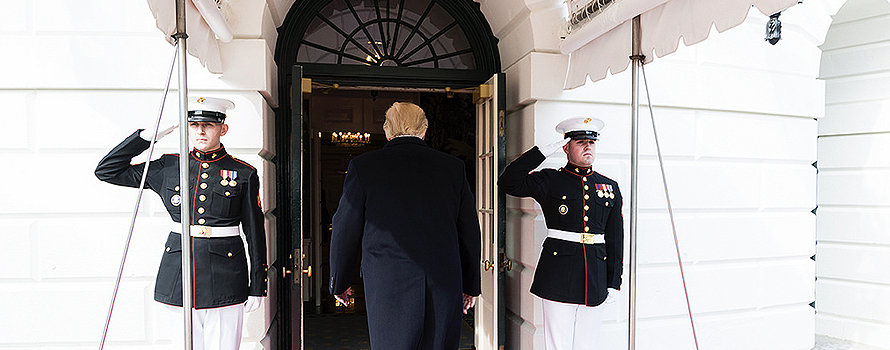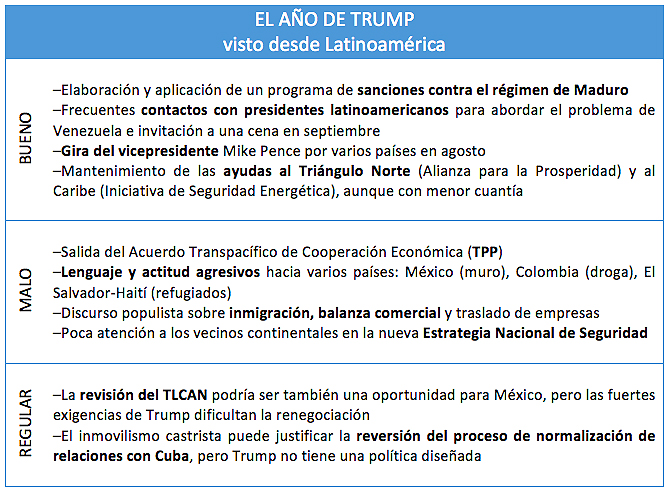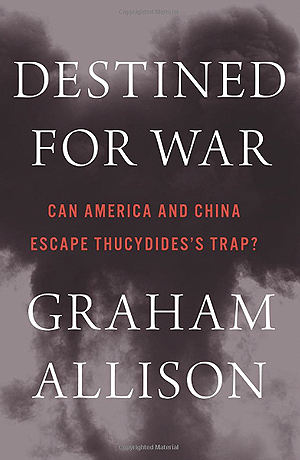Breadcrumb
Blogs
Entries with tag u.s.a. .
Continental U.S. neighbors are having a hard time interpreting the first year of the new Administration.
Donald Trump arrives at his first anniversary as president having sparked some recent fires in Latin America. His rude disregard for El Salvador and Haiti, for the Issue of refugees welcomed in the United States, and his intemperate attention to Colombia for the increase in cocaine production worsen relations that, although already complicated in the case of Mexico, have had some good moments throughout the year, such as the dinner of presidents that Trump convened in September in New York in which a united action on Venezuela was outlined.

▲Trump, on completing 100 days as president [White House].
article / Garhem O. Padilla [English version].
One year after the arrival of the 45th President of the United States of America, Donald John Trump, to the White House -the inauguration ceremony was on January 20-, controversy dominates the balance of the new Administration, both in its domestic and international performance. The continental neighbors of the U.S., in particular, show bewilderment over Trump's policies toward the hemisphere. On the one hand, they regret the U.S. disinterest in commitments to economicdevelopment and multilateral integration; on the other, they note some activity in relation to some regional problems, such as Venezuela. The balance for the moment is mixed, although there is unanimous agreement that Trump's language and many of his manners rather threaten relations.
From TPP to NAFTA
In the economic field, the Trump era began with the final withdrawal of the United States from the Trans-Pacific Partnership agreement (TPP) on January 23, 2017. This made it impossible for the TPP to entrance into force, as the United States was the market for which the agreement emerged, which has affected the prospects of the Latin American countries that participated in the initiative.
The renegotiation of the North American Free Trade Agreement (NAFTA), demanded by Trump, was immediately opened. Doubts about the future of NAFTA, signed in 1994 and which Trump has described as a "disaster", have been prominent so far in his administration. Some of his demands, which Mexico and Canada oppose, are to increase the quota for products manufactured in the United States and the "sunset" clause, which would oblige the treaty to be reviewed methodically every five years and would cause it to be suspended if any of its three members were not in agreement. All of this stems from the U.S. president's idea of fail the treaty if it is not favorable to his country.
Cuba and Venezuela
If the quarrels with Mexico have not yet reached a conclusion, in the case of Cuba Trump has already retaliated against the Castro regime, with the expulsion in October of 15 Cuban diplomats from the Cuban embassy in Washington as a response to the "sonic attacks" that affected 24 U.S. diplomats on the island. The White House has also reversed some of the Obama Administration's conciliatory measures, when it realized that Castroism is not responding with open-minded concessions.
As far as Venezuela is concerned, Trump has made forceful efforts to introduce measures and sanctions against corrupt officials, in addition to addressing the political status with other countries, so that they support those efforts aimed at eradicating the Venezuelan crisis, thus generating multilateralism among American countries. However, this policy has its detractors, who believe that the sanctions are not intended to achieve a long-term goal , and it is unclear how they would promote Venezuelan stability.
Although in these actions on Cuba and Venezuela Trump has alluded to the democratic principles violated by the rulers of Havana and Caracas, his Administration has not particularly insisted on the commitment to human rights, democracy and moral values, as had been usual in the argumentation of U.S. foreign policy. Some critics point out that the Trump Administration is willing to promote human rights only when they fit its political objectives.
This could explain the worsening opinion in Latin America about the United States and relations with that country. agreement to theLatinobarómetro 2017 survey , the favorable opinion has fallen to 67%, seven points below the 74% at the end of the Obama Administration. This survey sample a relevant difference for Mexico, one of the countries that, without a doubt, has the worst levels of favorable opinion towards the Trump Administration: in 2017 it was 48%, a drop of 29 points compared to 2016, when it was 77%.
 |
Immigration, withdrawal, decline
The restrictive immigration policies applied would also explain the rejection of the Trump Administration by Latin American public opinion. In the immigration section , the most recent is the decision not to renew the authorization to stay in the United States of thousands of Salvadorans and Haitians, who once arrived fleeing calamities in their countries.
It is also worth mentioning Trump's efforts to achieve one of his main objectives since the beginning of his political campaign: to build a border wall with Mexico. The U.S. president has not been very successful so far in this goal, since despite having sought ways to finance it, what he has managed to introduce in the budgets is very insignificant in relation to the estimated costs. On the other hand, his decision
Trump's protectionism entails a retreat that may be accentuating the decline of the United States as a leader in Latin America, especially vis-à-vis other powers. China has been increasing its economic and political engagement in countries such as Argentina, Brazil, Chile, Peru and Venezuela. Russia, for its part, has strengthened its diplomatic and security relations with Cuba. It could be said that, taking advantage of the conflicts between the island and the United States, Moscow has sought to keep it in its orbit through a series of investments.
Security threats
This brings us to the new US National Security Strategy, announced in December. The document, presented by Trump, addresses the rivalry with China and Russia, and also refers to the challenge posed by the Cuban and Venezuelan regimes, because of the alleged security threats they pose and the Russian support they receive. Trump expressed his strong desire to see Cuba and Venezuela join in "shared freedom and prosperity" and called for "isolating governments that refuse to act as responsible partners in advancing hemispheric peace and prosperity.
Similarly, the new U.S. Security Strategy alludes to other challenges in the region, such as transnational criminal organizations, which impede the stability of Central American countries, especially Honduras, Guatemala and El Salvador. However, the document devotes only one page to Latin America, in line with Washington's traditional focus on the areas of the world that most affect its interests and security.
An opportunity for the United States to get closer to Latin American countries will be the Summit of the Americas, to be held next March in Lima. However, nothing is predictable given the President's characteristic attitude, which leaves a great deal of room for possible surprises.
[Graham Allison, Destined for War. Can America and China Escape Thucydides's Trap? Houghton Mifflin Harcourt. Boston, 2017. 364 pages]
review / Emili J. Blasco [English version].
It is what has been called the Thucydides trap: the dilemma faced by a hegemonic power and a rising power that threatens that hegemony. Is war inevitable? When Thucydides narrated the Peloponnesian War, he wrote of the inevitability for dominant Sparta and rising Athens to think of armed confrontation as a means of settling the conflict.
That these two Greek polis necessarily thought of war, and eventually came to it, does not mean that they had no other options. History has shown that there are: when Wilhelmine Germany threatened to overtake Britain's naval strength, the attempted sorpasso (accompanied by various circumstances) led to World War I, but when Portugal was overtaken by Spain in overseas possessions in the 16th century, or when the United States replaced Britain as the world's leading power in the late 19th century, the handover was peaceful.
The call for Washington and Beijing to do all they can to avoid falling into the trap described by the Greek historian is made by Graham Allison in Destined for War. Can America and China Escape Thucydides's Trap? The founding Dean of Harvard's Kennedy School of Government reviews in his book several historical precedents. The Belfer Center for Science and International Affairs of the same University, of which Allison is director, has researched these precedents in a program called Thucydides's Trap.
This concept is defined by Allison as "the strong structural stress caused when an emerging power threatens to unseat a reigning power. In such a status, not only extraordinary or unexpected events, but even ordinary hotspots of tension in international affairs can trigger large-scale conflicts".
 |
This structural stress is produced by the clash of two profound sensitivities: the emerging power syndrome ("the reinforced sense that an emerging state has of itself, its interests and its right to recognition and respect"), and its inverse image, the reigning power syndrome ("the established power exhibits a heightened sense of fear and insecurity as it faces signs of decline").
Alongside the syndromes both rival powers also experience a security dilemma: "a rising power may disregard the fear and insecurity of a leading state because it knows that it itself is well-intentioned. Meanwhile, its opponent misinterprets even positive initiatives, taking them as excessively demanding or even threatening".
The use of military force
Allison starts from the fact that China is already catching up with the US as a power. It has done so in terms of its Economics Issue (China has already surpassed the U.S. in Purchasing Power Parity) and in relation to some aspects of military strength (a Rand Corporation report predicted that in 2017 China would have "advantage" or "rough parity" in 6 of 9 areas of conventional capability. The author's assumption is that China will soon be in a position to wrest the scepter of major superpower from the United States. Faced with this status, how will both countries react?
In the case of China, its millennial perspective will probably lead it to an attitude of patience, provided that there is some small progress in its purpose to increase its specific world weight. Since 1949, China has resorted to force in only three out of 33 territorial disputes. In those cases, China's leaders waged war - limited wars, conceived as notice to their opponents - despite the fact that the enemy was equal or greater, urged on by a domestic unrest status .
For Allison, "as long as events in the South China Sea generally move in China's favor, it seems unlikely that China will use military force. But if trends in the correlation of power were to turn against it, particularly at a time of domestic political instability, China would initiate a limited military conflict against an even larger and more powerful state such as the United States.
For its part, the United States can opt for several strategies, according to Allison: adapt to the new reality, undermine Chinese power (trade war, encourage provincial separatism), negotiate a lasting peace and redefine the relationship. The author does not give a firm committee , but seems to suggest that Washington should move between the last two options.
He recalls how Great Britain realized that it could not compete with the United States in the Western Hemisphere, and how this led to a partnership between the two countries, which became evident in the First and Second World Wars. This would have to involve accepting that the South China Sea is an area of Chinese influence. And this is not out of mere condescension, but because the United States is proceeding with a real clarification of its vital interests.
Despite its positive tone, Destined for War is one of the essays of the American establishment that most openly announces the end of the American era and the passing of the baton to China (it does not seem to envision a multipolar or bipolar world, but rather the primacy of the Asian power). It is also one of those that places less emphasis - certainly less than it should - on the strengths of the United States and the problems that could undermine China's coronation.
